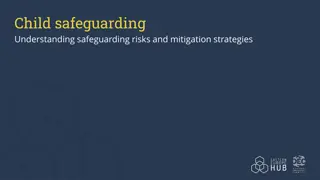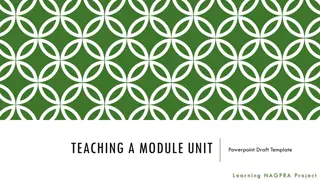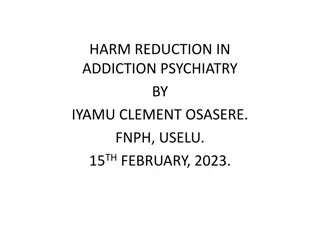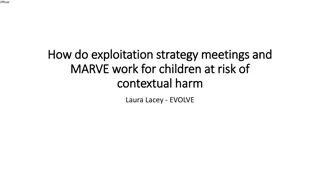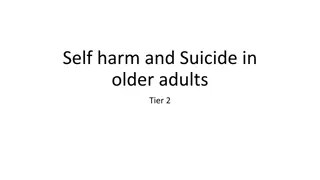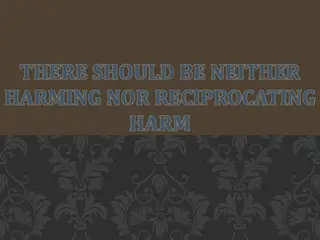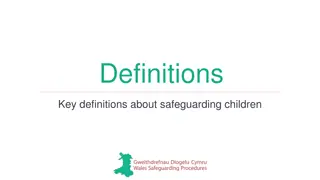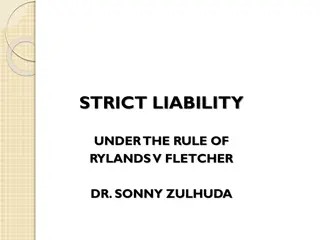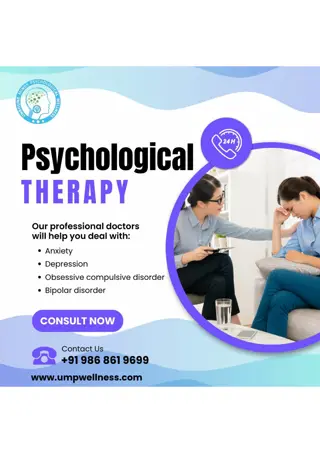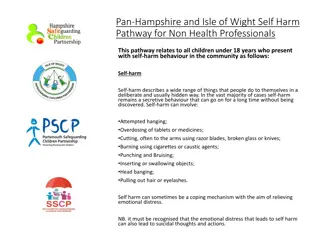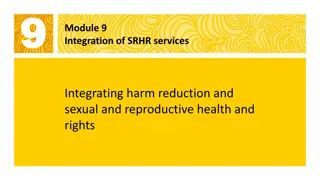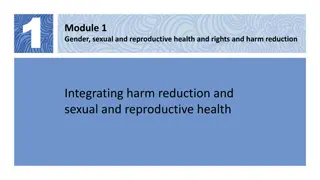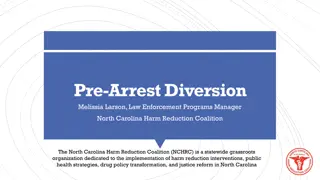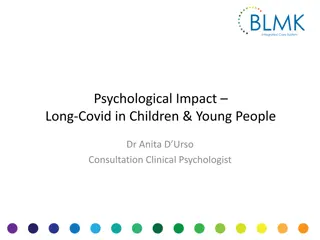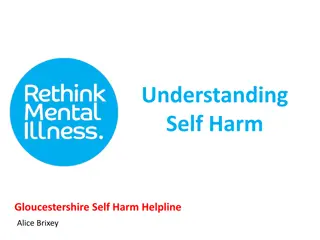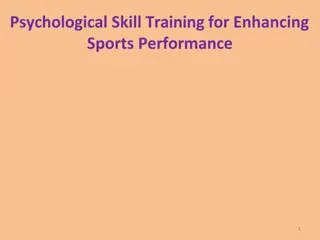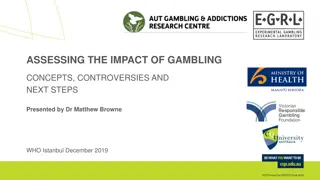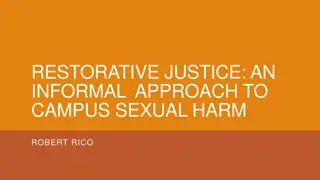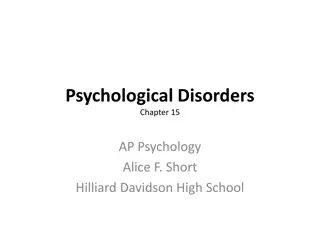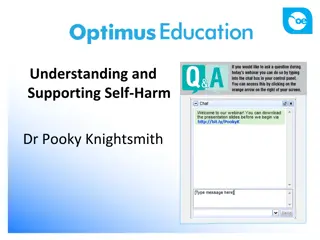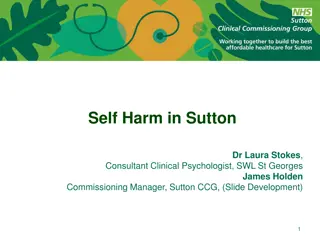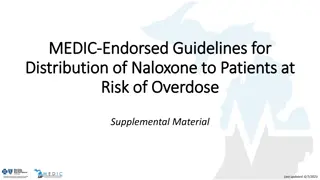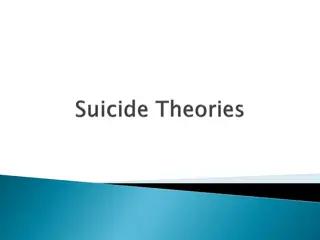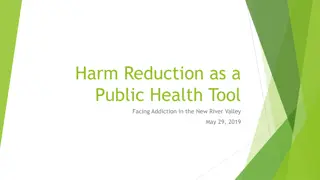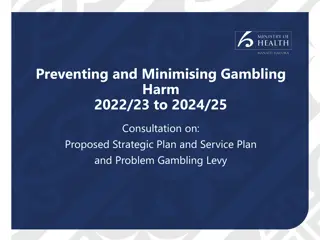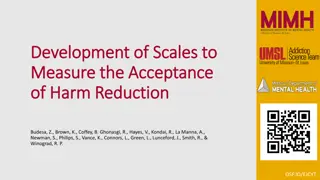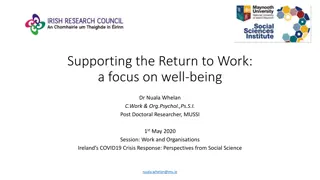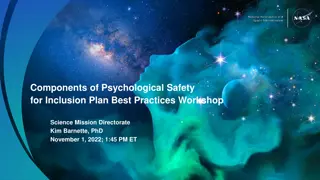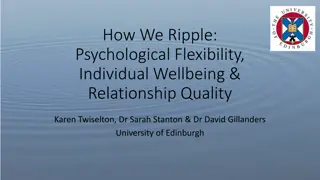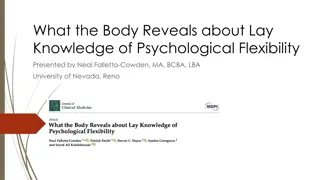Understanding Psychological Claims in the Workplace
Exploring the rise of psychological claims in work comp, this information covers types of mental stress claims, psychological claim regulations by state, standards of causation for physical injury-mental stress and mental stress-mental stress, as well as examples of how work-related stress can impac
1 views • 22 slides
The Power of Collaboration in Harm Reduction and Public Safety Partnerships
Learn about successful collaborations in harm reduction and public safety to prevent overdose, featuring insights from various presenters and an overview of pilot projects supported by the National Council and CDC. The webinar emphasizes evidence-based strategies, integration of harm reduction and p
1 views • 31 slides
Responsibilities in Ensuring Psychological Health and Safety
The primary duty of care under the WHS Act 2011 encompasses physical and psychological health. Non-compliance can lead to significant penalties, including fines and imprisonment. To address psychological impacts, implementing strategies like ALGEE from Mental Health First Aid Australia can help redu
0 views • 8 slides
The Truth Revealed Does Cannabis Harm Brain Cells.docx
The Truth Revealed: Does Cannabis Harm Brain Cells?\nIn recent years, the debate surrounding the effects of cannabis on brain health has intensified. With the growing popularity of cannabis and the increasing accessibility of products from online weed dispensaries and marijuana dispensaries, it\u201
9 views • 3 slides
Understanding Significant Harm in Child Protection Cases
In child protection cases, significant harm must be proven for court intervention. Harm can include ill-treatment or impaired health and development. The state may intervene if necessary, but diverse parenting standards are tolerated. Evidence-based findings are crucial, and local authorities must p
0 views • 11 slides
Understanding Child Safeguarding Risks and Mitigation Strategies
Understanding child safeguarding risks and mitigation strategies is crucial for organizations to prevent harm to children. This includes identifying who in an organization has contact with children, understanding different forms of abuse, and implementing safeguarding measures. Safeguarding involves
0 views • 34 slides
Exploring the Ethics of Do No Harm in Research and Practice
Delve into the profound concept of "Do No Harm" as it relates to bioethics, research, and medical practice. Examine the historical origins of this principle, differing perspectives on harm, and the implications of non-maleficence in research settings. Gain a comprehensive understanding of the Nuremb
1 views • 15 slides
Harm Reduction in Addiction Psychiatry: A Comprehensive Overview
Harm reduction in addiction psychiatry is a client-centered approach that focuses on reducing negative consequences associated with substance use. This philosophy involves practical strategies and principles aimed at promoting safer drug use practices. The historical background traces the evolution
1 views • 40 slides
Understanding Exploitation Strategy Meetings and MARVE for Children at Risk of Contextual Harm
To address concerns of extra familial harm affecting children and young people, this session delves into exploitation strategy meetings and MARVE intervention. Learn about making effective referrals, identifying risks, and when to convene strategy meetings to safeguard vulnerable individuals from ha
1 views • 25 slides
Understanding Self-Harm and Suicide in Older Adults
Self-harm and suicide in older adults are serious issues that require attention due to the associated risks. The incidence of self-harm in adults aged 65 years and older is notable, with factors such as physical health conditions, pain, and psychiatric history contributing to the risk. Staff should
0 views • 23 slides
The Significance of Avoiding Harm in Islam
This content delves into the noble hadith emphasizing the prevention of harm in society, exploring Islamic teachings on unintentional harm, and the importance of refraining from causing harm to oneself or others. Discussions on Islamic law, societal implications, and practical solutions highlight th
0 views • 14 slides
Understanding Self-Harm and Suicide in Older Adults
Exploring the definition, risk factors, incidence rates, and staff approaches related to self-harm and suicide in older adults. It emphasizes the seriousness of self-harm in this demographic, the associated risk factors, and the importance of responding with compassion and support. The content delve
0 views • 21 slides
Understanding Safeguarding Children and Child Protection
Safeguarding children involves taking proactive measures to promote their well-being and protect them from harm, including abuse and neglect. Child protection focuses on identifying and responding to children who are at risk of significant harm. Different types of harm, such as physical, sexual, emo
0 views • 24 slides
Strict Liability under the Rule of Rylands v. Fletcher
Strict liability under the rule of Rylands v. Fletcher establishes that a person who brings something onto their land that is likely to cause harm if it escapes is responsible for any resulting damage, regardless of negligence. The case of Rylands v. Fletcher (1868) set the precedent for this doctri
0 views • 17 slides
Unbound Minds Psychological Clinic For Children And Adolescent | Book Now
Unbound Minds Psychological Clinic, is a top-notch psychological clinic, we dedicated genuine & best psychological treatment with professional team. Get certified treatment with more benefits. Hire our experienced psychologist and get rid of stress a
1 views • 2 slides
Pan-Hampshire & Isle of Wight Self-Harm Pathway for Non-Health Professionals
This pathway provides guidance for children under 18 presenting with self-harm behaviors, including definitions, risk scenarios, suggested responses, and further considerations for urgent medical and psychological support in self-harm cases. It covers various types of self-harm, levels of risk, and
0 views • 5 slides
Theories of Causation in Psychological and Social Sciences
Overview of theories of causation categorized into psychological, social psychological, and sociological perspectives. Psychological theories focus on instinctive, biological, and psychological qualities of abusers, including Attachment Theory, Psychodynamic Theory, Social Learning Theory, and Situa
0 views • 15 slides
Integrating Harm Reduction and SRHR Services for Women and Gender Non-Conforming People Who Use Drugs
This module focuses on integrating harm reduction and sexual and reproductive health and rights (SRHR) services for women and gender non-conforming individuals who use drugs. It aims to identify gaps in service provision, map appropriate client-oriented SRHR services, and develop action plans to imp
0 views • 10 slides
Understanding Gender, Sexual Health, and Harm Reduction
Explore the intersection of gender norms, sexual and reproductive health, and harm reduction in Module 1. Learn about the impacts of gender inequality, stereotypes, and the importance of integrating SRHR services into harm reduction programs. Engage in activities to challenge traditional gender role
0 views • 21 slides
Understanding Self-Harm and Suicide in Older Adults
Self-harm and suicide in older adults present unique challenges due to factors like underreporting and stigma. The incidence of self-harm in this age group is significant, with specific risk factors and warning signs to consider. Proper staff approaches and preventative strategies are crucial in add
1 views • 23 slides
Implementing LEAD Program for Pre-Arrest Diversion in North Carolina
North Carolina Harm Reduction Coalition (NCHRC) implements harm reduction interventions, public health strategies, and justice reform through programs like LEAD (Law Enforcement Assisted Diversion). LEAD diverts low-level drug offenders and sex workers to treatment instead of the traditional crimina
0 views • 7 slides
Psychological Impact of Long Covid in Children and Young People
Psychological impact of Long Covid in children and young people includes sleep problems, worsening of pre-existing psychiatric symptoms, emotional distress like depression and anxiety, and mixed results in terms of quality of life and resilience. Beyond physical symptoms, psychological effects such
2 views • 5 slides
Understanding Self Harm: Exploring the Impact and Coping Strategies
Self-harm, a complex behavior not limited to mental illness, is a way individuals cope with distress. The behavior ranges from smoking to life-threatening actions like overdosing. It affects a significant number of young people, with a notable increase in treatment for deliberate self-harm cases. De
0 views • 30 slides
Enhancing Sports Performance Through Psychological Skill Training
Sports psychology delves into the psychological factors affecting athletic performance, emphasizing the importance of Psychological Skills Training (PST) to equip athletes with mental skills tailored to their individual needs. These skills techniques help in enhancing self-confidence, goal-setting,
0 views • 29 slides
Understanding the Impact of Gambling: Concepts, Controversies, and Next Steps
Dr. Matthew Browne's presentation in Istanbul in December 2019 discussed the theoretical framework, burden of harm projects in Australia and New Zealand, current work, and conclusions related to the adverse consequences of gambling on health and well-being. Focus areas included harm distribution, ta
0 views • 18 slides
Exploring Restorative Justice in Addressing Campus Sexual Harm
Restorative justice offers an informal approach to addressing campus sexual harm by involving harmed parties, offenders, and others in a collaborative decision-making process. It focuses on holding responsible parties accountable, repairing harm, rebuilding trust, and addressing underlying issues th
0 views • 20 slides
Understanding Psychological Disorders: Theoretical Approaches and Abnormal Behavior
Explore the realm of psychological disorders through theoretical approaches such as the Biological, Psychological, and Sociocultural models. Delve into the complexities of abnormal behavior, including definitions and examples. Gain insights into the impact of biological, psychological, and sociocult
0 views • 47 slides
Understanding and Supporting Self-Harm - Insights and Guidance
Discover the various types of self-harm behaviors, reasons behind self-harming tendencies, common triggers, and practical ways to respond and offer support. Gain insights into the negative emotions and cycles associated with self-harm and understand why individuals may engage in such actions.
0 views • 32 slides
Self-Harm Trends and Factors in Sutton
The data presented in the slides highlight concerning trends in self-harm rates, particularly among young girls, in Sutton. Key issues such as peer pressure, suicidal thoughts, exam pressure, and mental health challenges are identified. Factors contributing to high self-harm rates are discussed, inc
0 views • 14 slides
Understanding Opioid Epidemic Impact & Harm Reduction in Michigan
The Michigan Emergency Department Improvement Collaborative (MEDIC) works to improve emergency care quality, with a focus on opioid overdose. Over 3,000 Michiganders died from opioid overdose in 2021, exceeding motor vehicle-related deaths. Harm reduction strategies, like distributing naloxone in ED
0 views • 10 slides
Significance of Psychological Theories in Understanding Suicidal Behavior
Psychological theories play a crucial role in guiding research, clinical work, and the development of new hypotheses related to suicidal behavior. The Interpersonal-Psychological Theory of Suicidal Behavior emphasizes social forces, such as disturbed regulation of individuals by society, social inte
0 views • 14 slides
Utilizing Harm Reduction for Addressing Addiction in New River Valley
In this presentation, Michael E. Kilkenny discusses the importance of harm reduction as a public health tool in combating addiction issues in the New River Valley. The talk highlights the benefits of harm reduction, components of successful implementation, and measures of program success. It also ad
0 views • 20 slides
Consultation on Preventing and Minimising Gambling Harm 2022-2025 Strategic Plan and Levy Proposal
The consultation focuses on the proposed strategic plan and service plan to prevent and minimize gambling harm from 2022 to 2025. It covers the context of gambling harm, the Gambling Act requirements, problem gambling levy, and the assessment of gambling harm needs. Key points include the definition
1 views • 29 slides
Development and Evaluation of Harm Reduction Acceptance Scales
Development of scales to measure the acceptance of harm reduction is crucial for understanding public attitudes towards harm reduction strategies. This project focuses on creating valid and reliable scales through a systematic process involving item development, data collection, analysis, and refine
0 views • 15 slides
Pan-Hampshire & Isle of Wight Self-Harm Pathway for Non-Health Professionals
This pathway provides guidance for children under 18 years presenting with self-harm behavior. It covers various forms of self-harm, risk scenarios, responses, and considerations for urgent medical or psychological support.
0 views • 5 slides
Supporting Well-Being for Return to Work Amidst COVID-19 Crisis: Focus on Psychological Health
Amidst the challenges of returning to work post-COVID-19, it is essential to prioritize well-being and psychological health for a successful transition. Dr. Nuala Whelan's research sheds light on the impact of unemployment, emphasizing the need for support in job matching, upskilling, and psychologi
0 views • 9 slides
The Relationship Between Cognitive Flexibility and Psychological Flexibility After Acquired Brain Injury
This study explores how cognitive flexibility and psychological flexibility interact after an acquired brain injury. It examines whether individuals who exhibit cognitive inflexibility can achieve psychological flexibility, considering the impact of cognitive impairments post-injury. Cognitive flexi
0 views • 21 slides
Understanding Psychological Safety for Inclusive Environments
This presentation explores the components of psychological safety according to current research, emphasizing its role in fostering inclusive environments. It delves into the NASA Science Strategic Approach, defines psychological safety based on Dr. Timothy Clark's 4-stage model, discusses team psych
0 views • 11 slides
Psychological Flexibility and Relationship Quality Study
This study explores the relationship between psychological flexibility, individual wellbeing, and relationship quality. It reveals correlations between psychological flexibility, positive affect, negative affect, satisfaction with life, psychological wellbeing, and relationship quality in romantic r
0 views • 18 slides
Understanding Psychological Flexibility through Embodied Knowledge
Psychological flexibility plays a crucial role in mental well-being and behavior. This study explores whether untrained individuals can grasp psychological flexibility concepts based on body language and how people physically express flexibility or inflexibility in response to challenging situations
0 views • 18 slides





